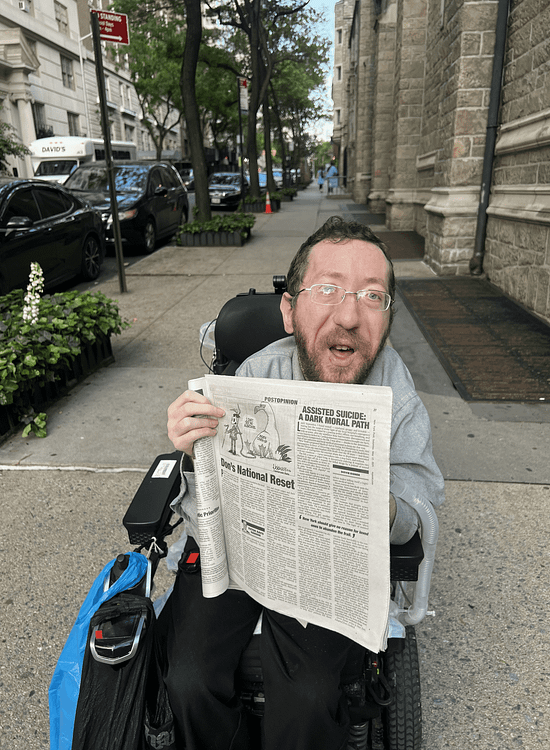
New York is one step closer to legalizing physician-assisted suicide. Last week, on June 9, the state senate passed the Medical Aid in Dying Act—which, critics say, would be the worst law of its kind in the United States. The bill’s future now depends on Governor Kathy Hochul, whose office has said she “will review the legislation.”
In my reporting on the subject, I have spoken to people with devastating diagnoses who long for greater agency at the end of life. I have also spoken to others with severe medical conditions who fear a world in which euthanasia is seen as a treatment option by doctors. But my thinking about this topic has been profoundly shaped by one person in particular: my friend Dovie, a 34-year-old New Yorker who lives with a life-altering, and sometimes life-threatening, condition called nemaline myopathy.
Before New York’s bill passed, Dovie wrote a poignant piece for UnHerd about why, as a person with disabilities, he is opposed to MAID. We’re reprinting it today. Dovie notes that, though he is grateful for the healthcare system that has helped keep him alive, that system is often “chaotic and disorganized,” and without “constant vigilance” on his part, his interests are all too easily overlooked. Just days later, Dovie’s portable ventilator—on which his life depends—failed him for a second time in less than a year, sending him into severe hypoxia. As I write, he is in intensive care, fighting for his life. We’re honored to bring you his voice today. —Madeleine Kearns
Last September, I found myself—confused, groggy, and irritable—staring into the surgical dome light of my local hospital’s emergency room. My parents and the doctor at my bedside informed me that a passing police officer had found me not breathing and with no pulse after my ventilator hose had become disconnected and severe hypoxia kicked in. Cardiopulmonary resuscitation brought me back, and I’d been transported to the ER. I was alive—thanks to the determination of law enforcement and medical personnel to keep me that way.
New York’s proposed Medical Aid in Dying Act threatens to undo an assumption we all depend on—that the state is in the business of saving, not ending, lives. That is especially pertinent for people with disabilities such as me.
The bill, a mere 12 pages long, is deceptively enticing. At face value, it requires two doctors to sign off on a request for lethal drugs; the patient must be of sound mind and have a diagnosed terminal illness, with six months or fewer to live. The bill proposes, without using such language, to offer those wracked by painful, terminal illness “death with dignity” on their own terms.


